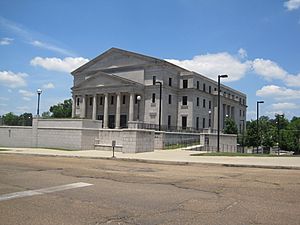Government of Mississippi facts for kids

|
|
| Part of | United States of America |
|---|---|
| Constitution | Constitution of Mississippi |
| Legislative branch | |
| Name | Legislature |
| Type | Bicameral |
| Meeting place | Mississippi State Capitol |
| Upper house | |
| Name | Senate |
| Presiding officer | Delbert Hosemann, President |
| Lower house | |
| Name | House of Representatives |
| Presiding officer | Jason White, Speaker |
| Executive branch | |
| Head of State and Government | |
| Title | Governor |
| Currently | Tate Reeves |
| Appointer | Election |
| Cabinet | |
| Leader | Governor |
| Deputy leader | Lieutenant Governor |
| Headquarters | Mississippi State Capitol |
| Judicial branch | |
| Courts | Courts of Mississippi |
| Supreme Court of Mississippi | |
| Chief judge | Michael K. Randolph |
| Seat | Jackson |
The Government of Mississippi is how the state of Mississippi is run. Like the United States government, Mississippi's government has different parts that share power. This is set up by the state's own Constitution. The main parts are the executive branch, led by the Governor, and the legislative branch, which makes laws. The current Governor is Tate Reeves. Mississippi is one of a few states that holds elections for its top leaders every four years, in the year before a Presidential election.
Contents
Executive Branch: Leading the State
The executive branch of Mississippi's government carries out the state's laws. It includes several important leaders. These leaders are elected by the people of Mississippi. They serve four-year terms.
The main leaders are the Governor and the Lieutenant Governor. Other key roles include the Secretary of State, Attorney General, State Auditor, and State Treasurer. There are also commissioners for agriculture and insurance. The governor and lieutenant governor can serve two terms in a row. Other officials can be re-elected many times.
Current Executive Leaders
- Governor: Tate Reeves
- Lieutenant Governor: Delbert Hosemann
- Secretary of State: Michael Watson
- Attorney General: Lynn Fitch
- State Auditor: Shad White
- State Treasurer: David McRae
- Commissioner of Agriculture and Commerce: Andy Gipson
- Commissioner of Insurance: Mike Chaney
All of these statewide leaders are currently from the Republican Party.
Legislative Branch: Making Laws
The legislative branch is called the Mississippi Legislature. This is where state laws are made. It has two parts, making it a bicameral legislature. These two parts are the Senate and the House of Representatives.
The Lieutenant Governor leads the Senate meetings. The House of Representatives chooses its own leader, called the Speaker. The state constitution allows for up to 52 senators and 122 representatives. Currently, there are 52 senators and 122 representatives. Both senators and representatives serve four-year terms. There are no limits on how many terms they can serve.
Judicial Branch: Interpreting Laws
The judicial branch is responsible for interpreting the laws. The highest court in Mississippi is the state Supreme Court. It has authority over the entire state. There is also a statewide Court of Appeals.
Below these, there are other courts like Circuit Courts, Chancery Courts, and Justice Courts. These courts handle cases in specific areas of the state. The nine judges on the Supreme Court are elected by citizens. They are chosen from three different districts. These judges serve eight-year terms. The ten judges on the Court of Appeals are also elected for eight-year terms. Judges for smaller local courts are elected for four-year terms by people in their area.
State Politics: How Leaders Are Chosen
For a long time, it was hard for African Americans to vote in Mississippi. This meant that many elections were decided by only a few people. After the federal Voting Rights Act of 1965 was passed, more African Americans were able to register and vote. This law helped make voting fairer for everyone.
In 1991, Kirk Fordice became the first Republican to win the governorship since the 1800s. He was also the first governor to be reelected to a second term since 1890. Over time, more Republicans began to win elections in Mississippi.
Recent Political Shifts
In 2007, Republicans won most of the statewide offices for the first time. By 2020, Republicans held every statewide office in Mississippi. This was a big change from earlier times when Democrats held most of the power.
Even though Republicans started winning more statewide offices, Democrats still had many seats in the state legislature for a while. However, in 2011, Republicans won a majority in both the State Senate and the State House. Since then, the Democratic groups in the state legislature have become mostly African-American members.
County Government: Local Leadership
Mississippi has 82 counties. County governments are the closest level of government to citizens. Each county has a Board of Supervisors. Members of this board are elected from specific areas within the county. Other county officials, like the sheriff, are elected by all voters in the county.
In the past, counties were divided into "beats." Each supervisor was in charge of roads and bridges in their own beat. This system worked when there were fewer people and communication was difficult. However, it sometimes led to problems like wasteful spending.
In the 1980s, there were efforts to improve how county governments spent money. This led to changes that made county purchasing systems more efficient. Now, county governments are set up to be more organized and effective in serving their communities.


